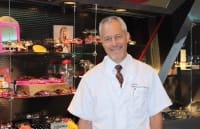how I
Thrive Without Managed Care
by Arnold Stokol, OD
Can a practice survive without managed care? Arnold Stokol, OD, said "no" to insurance almost 20 years ago. And, he has not looked back. The impetus, says Stokol, was quality of life, superior patient care, and profitability. On all fronts, the Richardson, Texas-based OD says his decision has delivered in spades.
Here, this groundbreaking optometrist tells us how he managed to operate sans managed care.
EB What is your optometric background?
AS I went to optometry school in South Africa and completed my optometric education at the University of Houston. Then, I moved to Dallas and started a practice there in 1981.
I have been in practice for 28 years now and have expanded twice. We've been in the present location since 1991. It's about 3,900 square feet, with 11 staff members (including four full-time opticians), and one other optometrist who comes in four days a week.
EB What is your practice's focus?
AS General optometry and frame and lens sales, which are probably about 55 percent of our total office production. We carry about 1,050 frames and we really cover it all, so no one should have to leave the office without finding something they like. We also have a strong concentration of higher-end lines.
EB When did you stop insurance?
AS I took it up until 1989, and it was one of happiest days of my life was when I dropped it. All dropping insurance—except Medicare because I thought it would be unfair to the elderly—did was make me more money. Both my gross and net went up.
EB What made you decide to do this?
AS The discount given to patients was calculated at 42 percent. At the time, I had a 10- and an eight-year-old and I figured it was better to spend time at home than to give people a 40 percent discount and just spin my wheels and work harder. I was never able to spend time with them because I just kept getting busier.
EB Did you have complaints from patients?
AS We really didn't have a major backlash. Some people were not happy about it, of course. There were people who never came back, but I knew that would be a consequence. The whole philosophy in the office got better, too, and people didn't come in with an automatic sense of entitlement.
I never had space in my schedule after we did that; there was no noticeable effect.
EB Does it limit your customer base today?
AS Patients can still submit their own insurance claims, so this makes it more appealing. People come in to see me because they want to see me, not because my name is on a list. This is a big part of what makes me still love what I do.
EB How has no insurance affected business growth?
AS It most definitely has increased; but one person can only do so much in a day. We are doing extremely well, and our net is very high because we're not doing managed care.
EB How do you differentiate yourself in the market?
AS We strive to deliver a total patient experience from the moment they walk into the office, from the way the optical looks to offering them a soda or coffee while they are waiting for dilation.
EB Is providing high-quality service your focus?
AS We are very, very conscientious to provide a professional level of care. There is actually nothing magical about what I do. I just charge a very fair fee and give an excellent level of health care. That makes people want to come back.
EB Who makes up your customer base?
AS Richardson is "Telecom Corridor," so we see many engineers but also blue collar workers. We see a broad spectrum of people of all ages, but my patient base has aged over years as I've aged—this is a natural phenomenon.
EB Do you do any external marketing?
AS We do no marketing whatsoever; our business has grown entirely by word of mouth.
EB Is this strategy more difficult to pull off today?
AS Yes, in a down economy patients look harder at things like this. In today's climate it would be more difficult, although the '80s and early '90s weren't so great, either. EB
| A View to Nepal |
|---|
| Every 18 months, Arnold Stokol, OD, makes a trip to Katmandu and spends about nine days trekking to the base of Mount Everest, where a memorial sits as a memorial for his son, Trevor, who passed away there in 2005. Dr. Stokol also brings along optical gifts for local people in need. "Whenever I go there, I take something that can help," he says. "On one trip I took 400 pairs of reading glasses and handed them out to elderly; on another trip I took safety glasses because there are a lot of stone masons there." 
|



